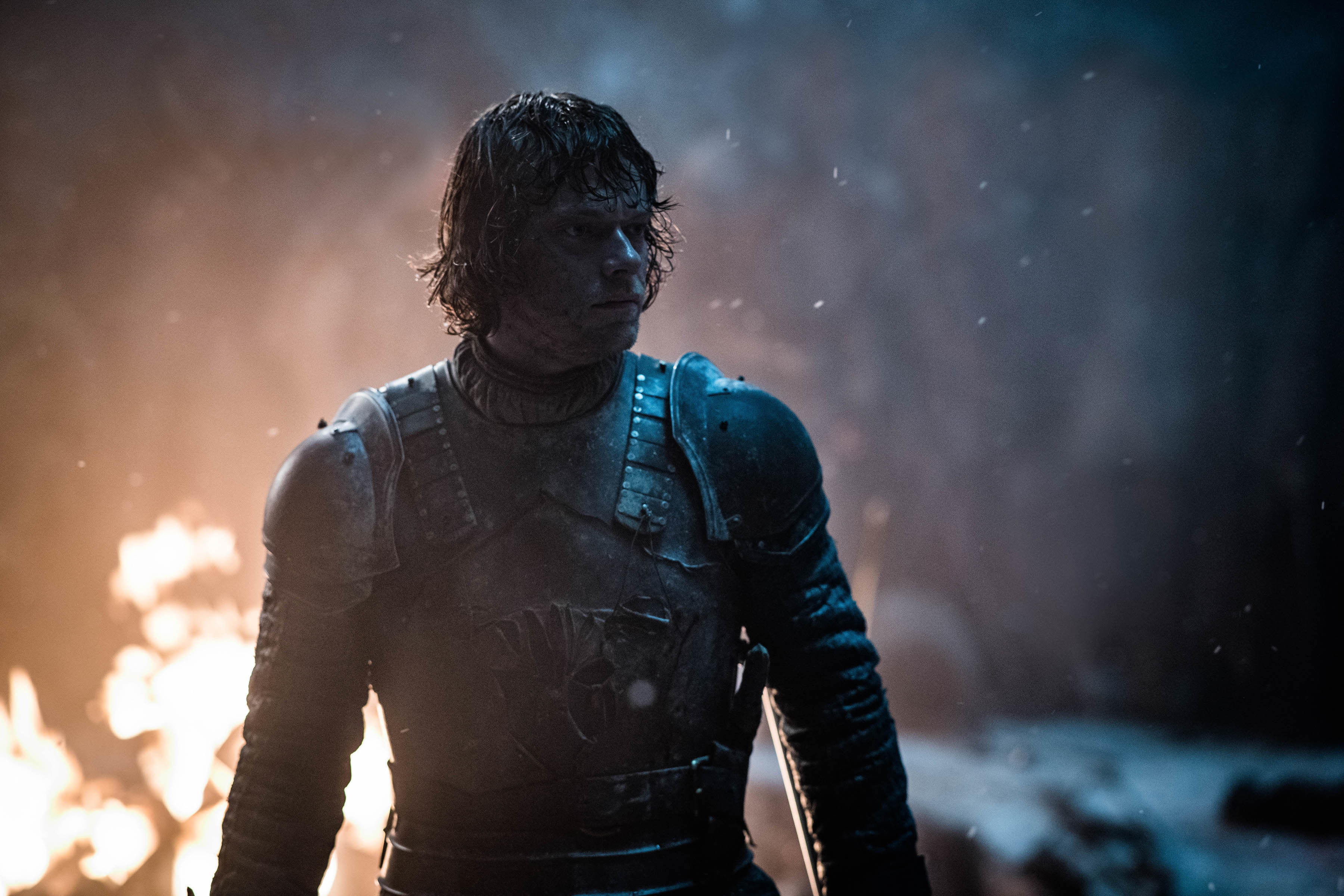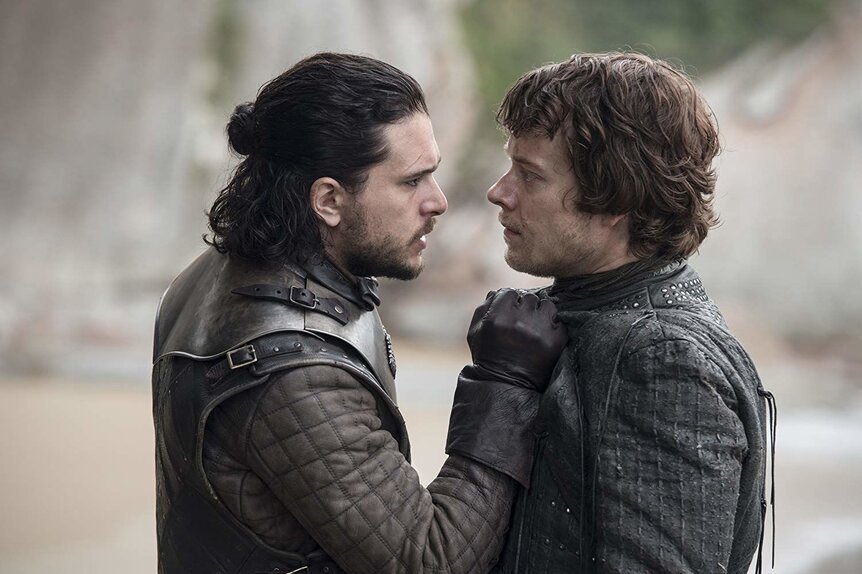Create a free profile to get unlimited access to exclusive videos, sweepstakes, and more!
Emmy Contender: Alfie Allen messed up on the first day of Game of Thrones — now he has an Emmy nom

Welcome to Emmy Contenders 2019. This month, SYFY WIRE is speaking to a long list of actors, artists, and artisans whose work earned them Emmy nominations this year. Today we speak with Alfie Allen, nominated for Outstanding Supporting Actor in a Drama Series for his role as Theon Greyjoy in Game of Thrones.
When Alfie Allen scored his first Emmy nomination last month, the reaction on Twitter was exultant. For Game of Thrones fans, it was a classic redemption story, because in exactly the same way that long-suffering Theon Greyjoy had finally been recognized as a good man (by Bran), as a Stark (by Sansa), and as a hero (by everyone else), the actor who portrayed him was finally getting overdue recognition as well (although he had to seek it out himself after HBO failed to submit his name for the award).
"Alfie Allen knows he's f***ing worth it," one fan wrote. "Nobody deserves a nomination more and it's about damn time," said another. And some expressed the hope that, if he won, his sister Lily Allen's song "Alfie" would be played as its subject walked up to accept the Emmy.
The irony of that would be that Lily's 2006 hit, written when her brother was still a teen, portrayed him as a slacker who was wasting his life away smoking pot, playing video games, and watching too much TV. "Alfie, please use your brain," Lily sang. In actual fact, though, Alfie wasn't just vegetating at the time — he was in Canada earning his qualification to teach kids how to snowboard. If he hadn't torn a ligament in his left knee, he might still be snowboarding. But the injury forced him to change career plans, and a trip to see the Broadway production of Doubt reoriented his life. Although Allen had dabbled in acting before he could even walk — his mother is a film producer, his father a comedian, and they gave him bit parts — seeing the play pushed him "to take acting seriously," he says. "I was debating, 'Do I go to drama school, or do I keep working in the field?' And I decided to just kind of get into it straight away."
At 21, Allen landed the role of anguished teen Alan Strang in the U.K. production of Equus, replacing Daniel Radcliffe, and his performance in that play was what convinced David Benioff and Dan Weiss to cast him in Game of Thrones after having him read for various parts, including Jon Snow, Viserys Targaryen, and Robb Stark.
"They said that there was an intensity in that role of Alan Strang that they wanted me to bring to Theon," Allen says. "There's a struggle there, an identity crisis that he has from the start."
Allen got off to a rough start on Game of Thrones, showing up for his first scene on the wrong day.
"It must have looked like I was being Mr. Diva or Mr. Egomaniac, wanting to be there when everyone else was," he says with a laugh. "I can't remember why I didn't understand, because I've seen a bloody call sheet before. But I was so nervous." Because Allen was there anyway, the showrunners inserted Theon into an early scene with Rodrik Cassel — the one in which he alerts Ned Stark that a deserter from the Night's Watch has been captured.
"They were like, 'Oh well, you might as well be in it,'" Allen recalls. "I think it helped set up that I was Ned's ward, or a kind of servant, but wasn't treated as such since I was given the run of the castle. It helped set up the dynamic between me and Ned." He says he was also able to help calm the first-time nerves of Isaac Hempstead Wright (Bran Stark) and Kit Harington (Jon Snow), who, unlike Allen, had never been in front of a camera before.
"None of us really knew what was going on," he says.
Allen soon started honing his technique. Although he admits he doesn't have a particular process, he's a keen observer of other people. ("That makes me sound like a creepy voyeur!" he says, with a laugh. "I just like people-watching a hell of a lot.") He also watches a lot of movies. (Reservoir Dogs helped with Theon's extensive torture scenes in Season 3.) Naturally, he also mines emotions from his own life. (At one dramatic point in the show, he says, one of his own relatives was dying, "so I had stuff going on in my head already.")
Mostly, Allen tries to capture his character's emotions on his face. (Or, as one wildly admiring Twitter fan puts it, "He burns the words he says into the collective unconscious of the universe and then tells a 7-layer story just with his eyes; his scenes will live in your mind forever.")
"I know it sounds f***ing cheesy," Allen says, "but it is all in the eyes, you know? I think if you can harness that — and I'm not saying I have — but if you can, you're onto a winner."
In Season 2, Allen experimented with Theon's look following the reveal of the bodies of two children he'd killed in lieu of Bran and Rickon. There had been a hint of a smile on Theon's face, which crumbled as soon as he saw the corpses. Allen had initially wanted to keep the smile and lose the regret.
"I kind of thought Theon would enjoy playing a trick, that he would enjoy the moment a little too much," the actor says. "But David and Dan shut that down, and rightfully so because when I look back on it, it's that moment that gives you a window into Theon's shred of humanity."
Those little character windows — micro-expressions fleeting across Theon's face — are what made the once-reviled character seem vulnerable and empathetic. Even when he's clearly earned some degree of redemption, we can see that he's still suffering. At the beginning of Season 6, for example, following an escape from a Bolton-held Winterfell, Theon saves Sansa and kills a Bolton soldier, but he still looks to the ground instead of meeting Sansa's gaze.
"I remember making that choice and not being so sure about it at the time," Allen says. "But those little things can sell a whole journey. It's so minuscule, but I think those kinds of moments happen spontaneously, and it's always the best stuff when it's unplanned."
Theon's emotional torment struck a powerful chord with fans, who started coming up to Allen to share stories of how they've suffered PTSD, trauma, or abuse themselves, and how watching Theon survive Game of Thrones was therapeutic for them. Theon's miserable journey — culminating in his last stand against the Night King to protect Bran — was "beautifully done, to keep it rolling until the last moments," Allen says.
At times he felt that maybe the showrunners were "f***ing with me — and in a way, they kind of were, because I had to go through some of those dark moments, too. But I wouldn't change it. I'm glad that we got to say goodbye to the character as he finds honor and redemption. And to have people like it, that's a great feeling."



























